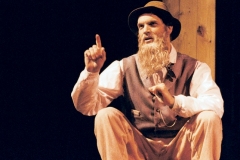
Created by Frederick Heide
A one-man show depicting the life of John Muir, founder of the national park system and the Sierra Club. The towering pines around the amphitheater in Peninsula State Park prove an ideal setting for the stories of Muir, a Wisconsin native. Written by AFT/Northern Sky co-founder Doc Heide, the show contains both original and traditional music and has been aired on PBS. Produced in 1990.
Door County Advocate
HEIDI HODGES – July 1996
“The Mountains Call My Name” uplifting
Uplifting. Relaxing. Informative and entertaining.
In a nutshell, that’s the American Folklore Theatre’s (AFT) production “The Mountains Call My Name.”
It is a grand one-man show detailing the life of naturalist John Muir, founder of the Sierra Club and the inspiration for the national park system.
Situated in a pine grove in Peninsula State Park, the cedar aroma surrounding the amphitheatre sets the mood long before the show even starts.
Off to one side on stage is a small “campsite.” An amazing backdrop , designed by artist James Maronek of Ellison Bay, mimics mountains, trees and sunsets.
The aesthetics are great, but AFT actor Jeff Herbst, as Muir, commands all attention once he enters the stage.
“The Mountains Call My Name” relates the stories of Muir’s life, in a production that runs a little more than an hour.
And what stories they are. Herbst deftly weaves together tales of Muir’s childhood and his wanderings and adventures, while the audience hangs on every word.
Created by Frederick “Doc” Heide, a veteran AFT producer, the show was originally introduced by the troupe in 1989 and proved to be one of its most poopular efforts to that point. Former AFT cast member Gerald Pelrine played Muir that year, backed up by vocalists Laurie Flanigan and Alice Peacock.
It was a departure from the ensemble’s original “format” shows, in which five musicians shared the stage at all times, singing songs and telling stories based on historical themes. But what was then a departure proved to be the wave of the future for the AFT.
The popularity of “Mountains” led AFT producers to resurrect it this year, with some revisions, for the troupe’s 26th season. Some stories from the original show were edited out, and different tales concerning Muir’s family and childhood were added.
In the original show, singers remained on stage and provided not only music and singing but also whispery voices from Muir’s past.
In the current “Mountains,” singer Karen Mal comes on stage only during songs and sings duets with Herbst, keeping the audience’s focus solely on Muir.
Songs in this year’s production, such as “My Love is Like a Red, Red Rose” and “Wild Mountain Thyme,” will undoubtably [sic] put a lump in your throat.
The lion’s share of the work belongs to Herbst, though, and it would take a firecracker under your seat to break the enchanting connection between audience and actor. Herbst is Muir. His physical appearance—a convincing beard and some wrinkles—gives not a hint of the real-life actor under it all.
All the stories are from Muir’s own published journals and writings. Clearly, the naturalist had an easy wit and a way with words.
One of the most engrossing stories involves a little dog that follows Muir out on a walk over an Alaskan glacier. The audience finds itself gasping at the mental picture of the perils the two faced. I won’t give away the ending, but it’s hard to find a dry eye in the audience at the story’s conclusion.
Another favorite tale is a touching account of Muir’s encounter with poet Ralph Waldo Emerson.
By the end, the audience feels a true kinship with Muir, who lived part of his life in Fountain Lake, WI. But even if you have never heard of Muir, you’ll enjoy this show—and learn something to boot.
“Due to the sophistication and pace of the show, you may wihs to leave younger children at home. They will love any of our other three shows this summer,” Heide mentioned.


